AI tools for philosophy ai bot
Related Tools:
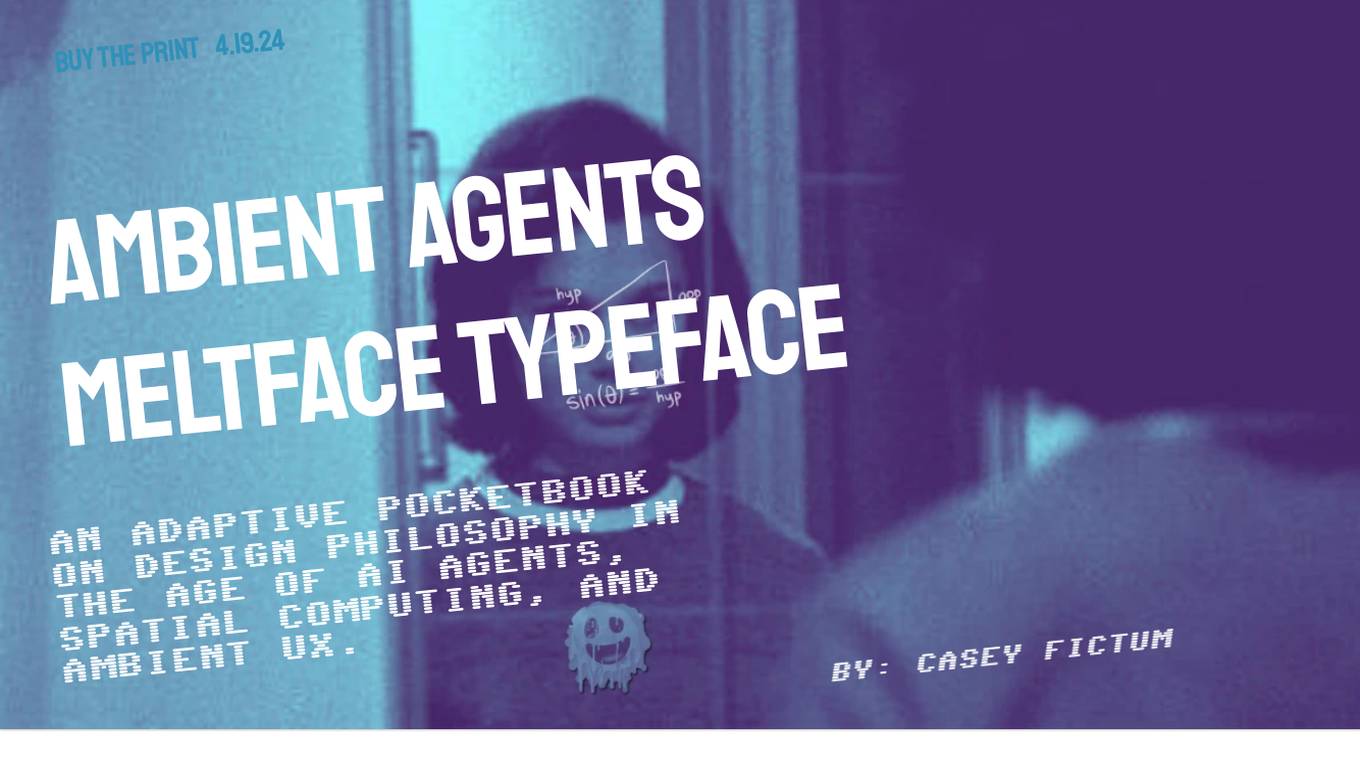
Meltface Typeface
Meltface Typeface is a book about the future of design in the age of AI agents, spatial computing, and ambient UX. It is written by Casey Fictum, a designer and philosopher who has been thinking about the future of technology for over 20 years. The book is divided into nine chapters, each of which explores a different aspect of the future of design. Chapter 1, "The Dawn of Ambient Intelligence," discusses the rise of AI agents and their potential to change the way we live and work. Chapter 2, "Artificial - This Thing Isn't Human," explores the challenges of designing AI agents that are both useful and ethical. Chapter 3, "Spatial - Around My Reality," discusses the potential of spatial computing to create new and immersive experiences. Chapter 4, "Ambient - There, But Not," explores the concept of ambient UX and how it can be used to create more seamless and intuitive experiences. Chapter 5, "Actioned - Do Things on Our Behalf," discusses the potential of AI agents to automate tasks and help us get things done. Chapter 6, "Philosophy for AI Agent Design," provides a philosophical framework for designing AI agents that are both ethical and effective. Chapter 7, "Frameworks for the Future of Design," provides a set of frameworks for thinking about the future of design. Chapter 8, "Guessing the Future of UX Design," speculates on what the future of UX design might look like. Chapter 9, "Finding Meaning & Purpose in the Future of Design," discusses the challenges and opportunities of designing for a future that is increasingly shaped by AI.
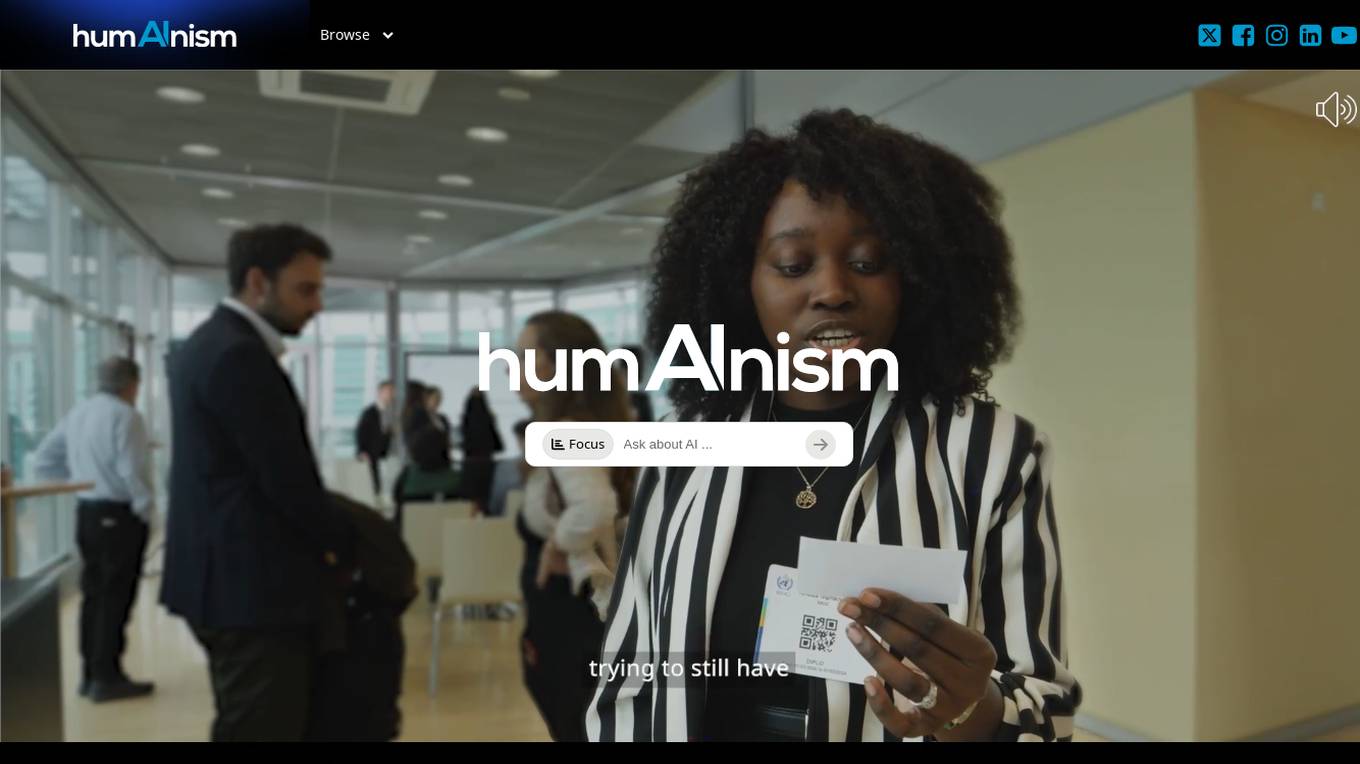
HumAInism
HumAInism is an AI application that focuses on AI governance, diplomacy, human studies, and the intersection of technology and humanity. It offers tools for explainability, transparency, standards, semantics, probability, aesthetics, and more. The platform aims to explore the ethical, societal, and philosophical implications of AI while providing practical solutions for governance and diplomacy.

Vincent C. Müller
Vincent C. Müller is an AvH Professor of "Philosophy and Ethics of AI" and Director of the Centre for Philosophy and AI Research (PAIR) at Friedrich-Alexander Universität Erlangen-Nürnberg (FAU) in Germany. He is also a Visiting Professor at the Technical University Eindhoven (TU/e) in the Netherlands. His research interests include the philosophy of artificial intelligence, ethics of AI, and the impact of AI on society.

Marcus Aurelius AI
Marcus Aurelius AI is an AI application that serves as your personal Stoic mentor, helping you conquer life's challenges. It offers chat interactions with Marcus Aurelius, daily stoic lessons, Stoicism quizzes, and personalized mentorship. Users can join the Stoic Club for a monthly fee and benefit from additional features. The application aims to provide guidance and support based on Stoic philosophy to help users navigate through life's ups and downs.

MentorAI
MentorAI is an AI-powered writing assistant that helps you write better, faster, and more efficiently. It uses natural language processing and machine learning to understand your writing style and provide personalized feedback. MentorAI can help you with a variety of writing tasks, including emails, essays, reports, and even creative writing.
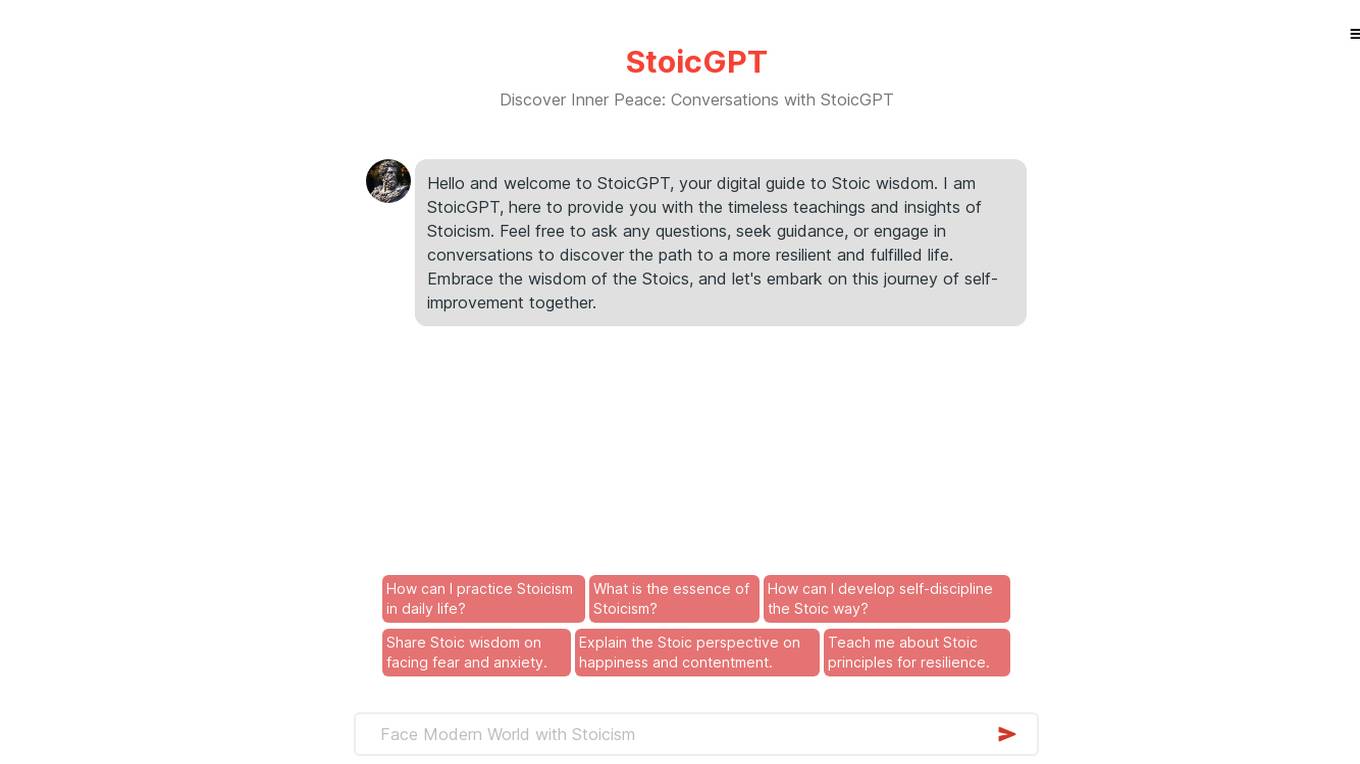
StoicGPT
StoicGPT is a digital guide to Stoic wisdom, providing timeless teachings and insights to help users discover inner peace and resilience. It offers personalized conversations, guidance, and support based on the principles of Stoicism, an ancient philosophy that emphasizes virtue, reason, and acceptance of fate.

SanatanaDharma.xyz
SanatanaDharma.xyz is an AI tool designed to assist users in exploring and understanding various aspects of Sanātana Dharma, including Bhagavad Gita, Vedas, Puranas, Yoga, and healthy living. The website features a chatbot that provides insights on topics such as karma, the Gayatri Mantra, Vedic interpretations, and more. Users can ask questions and engage in discussions to deepen their knowledge and spiritual understanding.
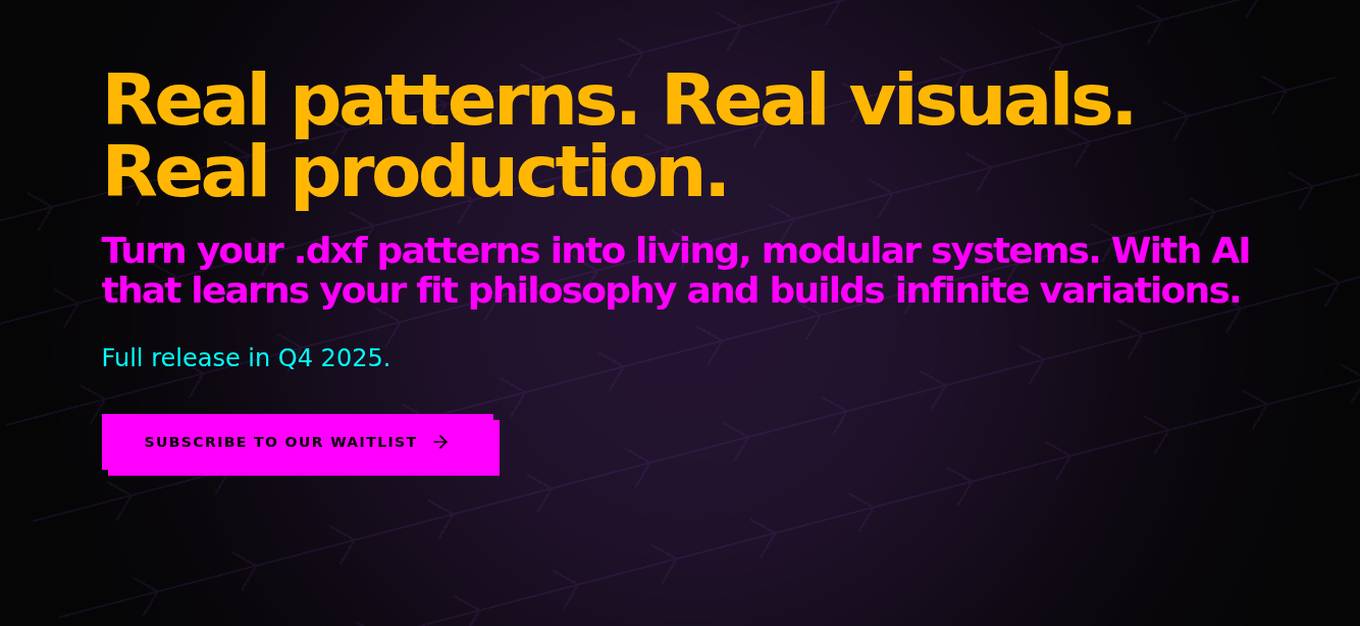
FashionINSTA
FashionINSTA is an AI pattern intelligence platform that revolutionizes the fashion industry by turning .dxf patterns into living, modular systems. It extracts 750+ features from each pattern, learns your fit philosophy, and generates infinite variations while preserving fit consistency. The system is built on real .DXF geometry, ensuring accurate visuals and fabric consumption calculations. With a focus on pattern truth and fit intelligence, FashionINSTA eliminates hidden waste, streamlines the design-to-manufacturing pipeline, and offers a self-growing system tailored to your brand's construction DNA.
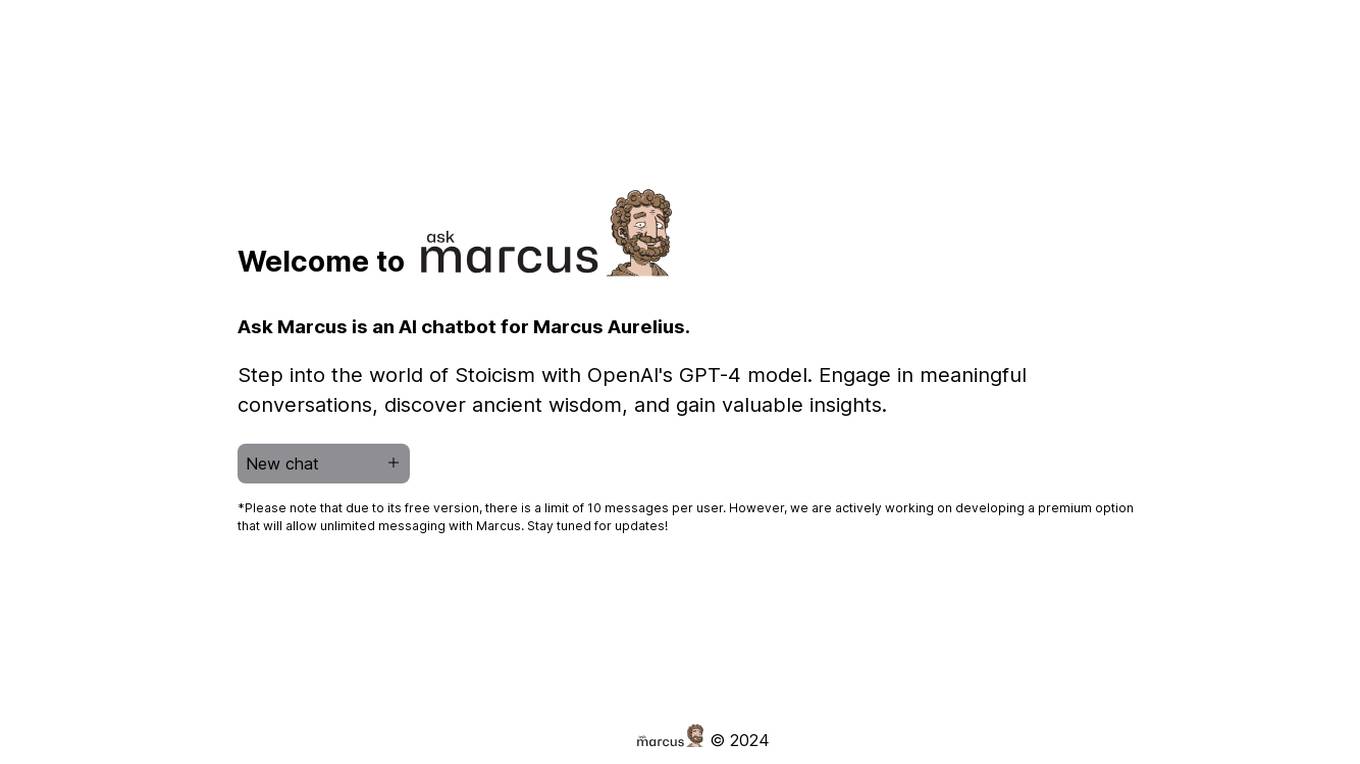
Ask Marcus
Ask Marcus is an AI chatbot designed to engage users in conversations with Marcus Aurelius, utilizing OpenAI's GPT-4 model. Users can explore the world of Stoicism, discover ancient wisdom, and gain valuable insights through meaningful interactions with the chatbot. The platform currently offers a free version with a limit of 10 messages per user, but a premium option is in development to enable unlimited messaging with Marcus. Stay tuned for updates on this exciting feature.
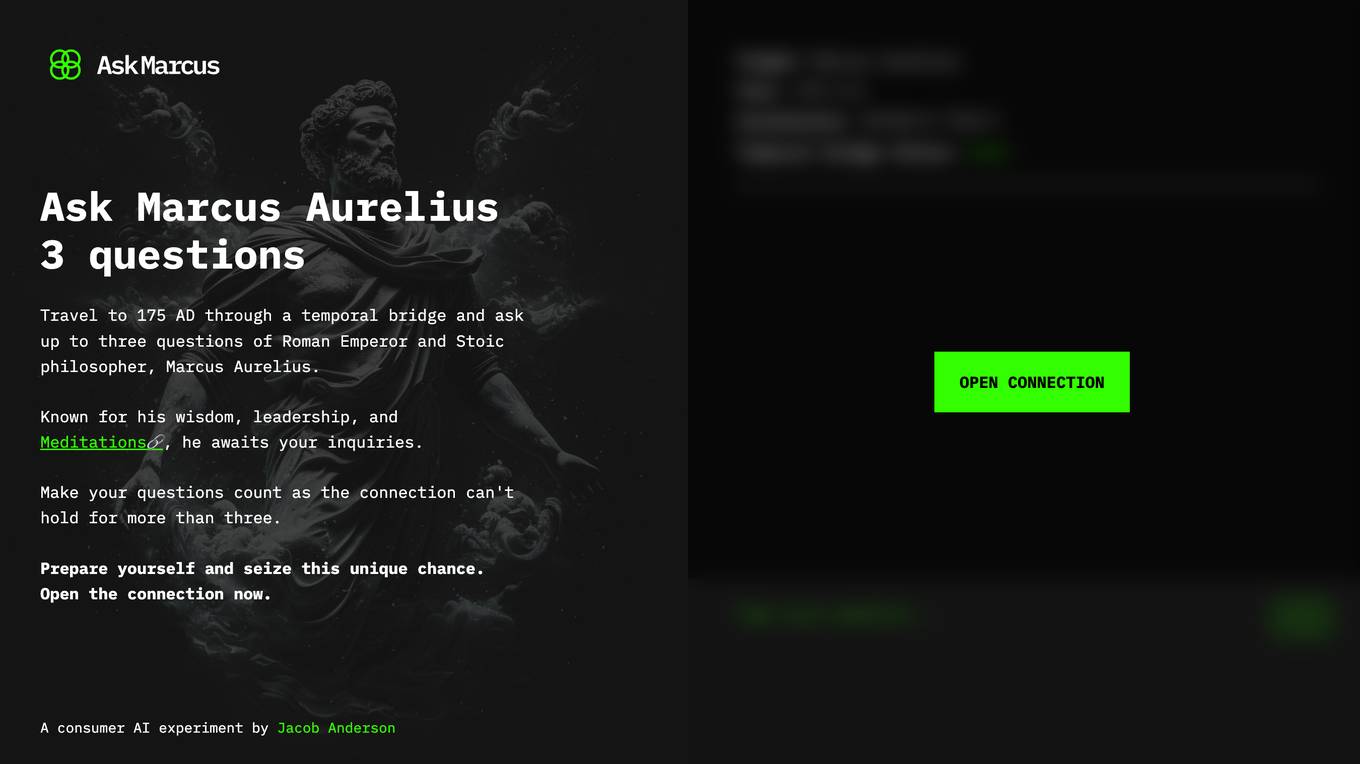
Ask Marcus
Ask Marcus is a consumer AI experiment that allows users to ask up to three questions to Roman Emperor and Stoic philosopher, Marcus Aurelius, who lived in 175 AD. The AI is designed to simulate a conversation with Marcus Aurelius, providing insights and wisdom based on his teachings and writings, particularly his famous work, Meditations. Users can access the AI through a temporal bridge, which connects them to Marcus Aurelius in his time period. The AI is designed to be informative and engaging, providing users with a unique opportunity to learn from one of history's greatest thinkers.
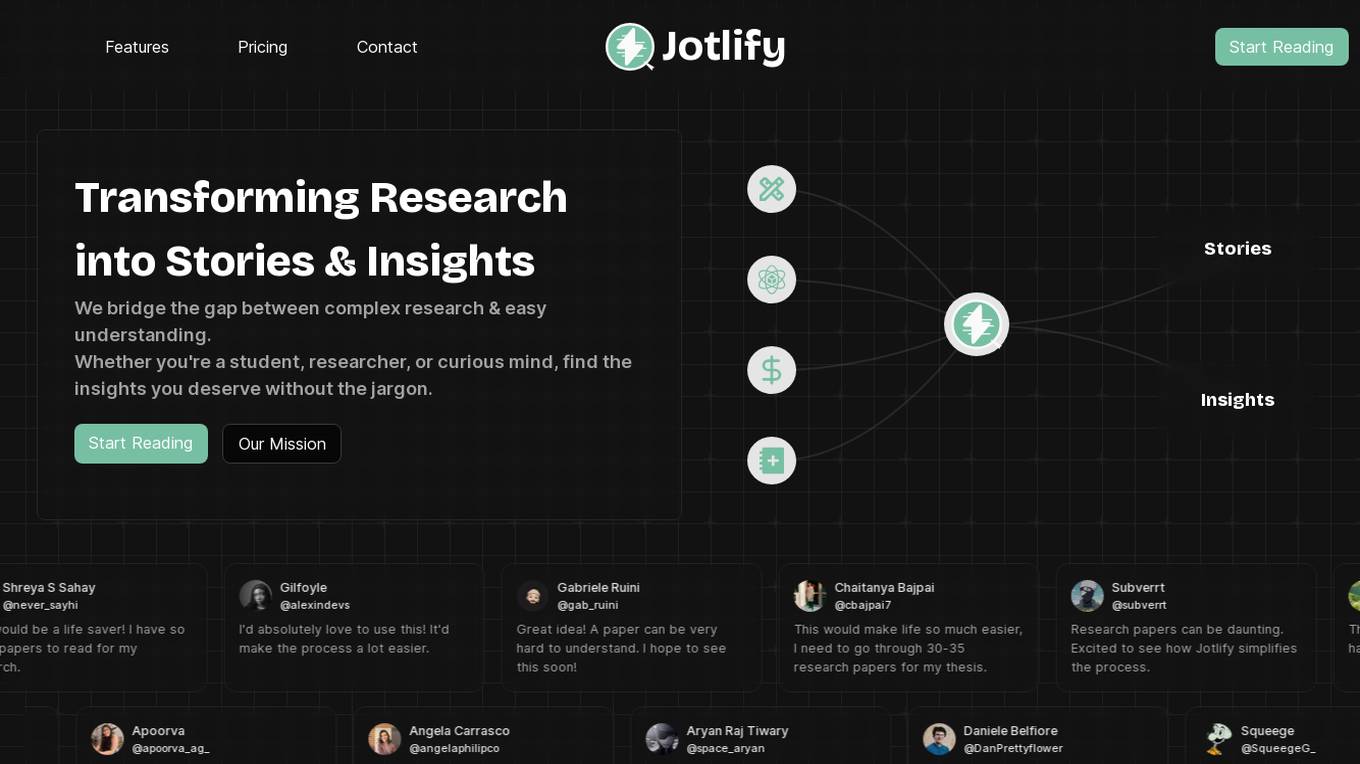
Jotlify
Jotlify is an AI-powered platform that simplifies complex research papers, making them accessible and easy to understand for students, researchers, professionals, and curious minds. It transforms dense academic content into engaging stories and insights, bridging the gap between complex research and easy understanding. With Jotlify, users can uncover stories and insights that can transform their understanding and impact various aspects of their lives.
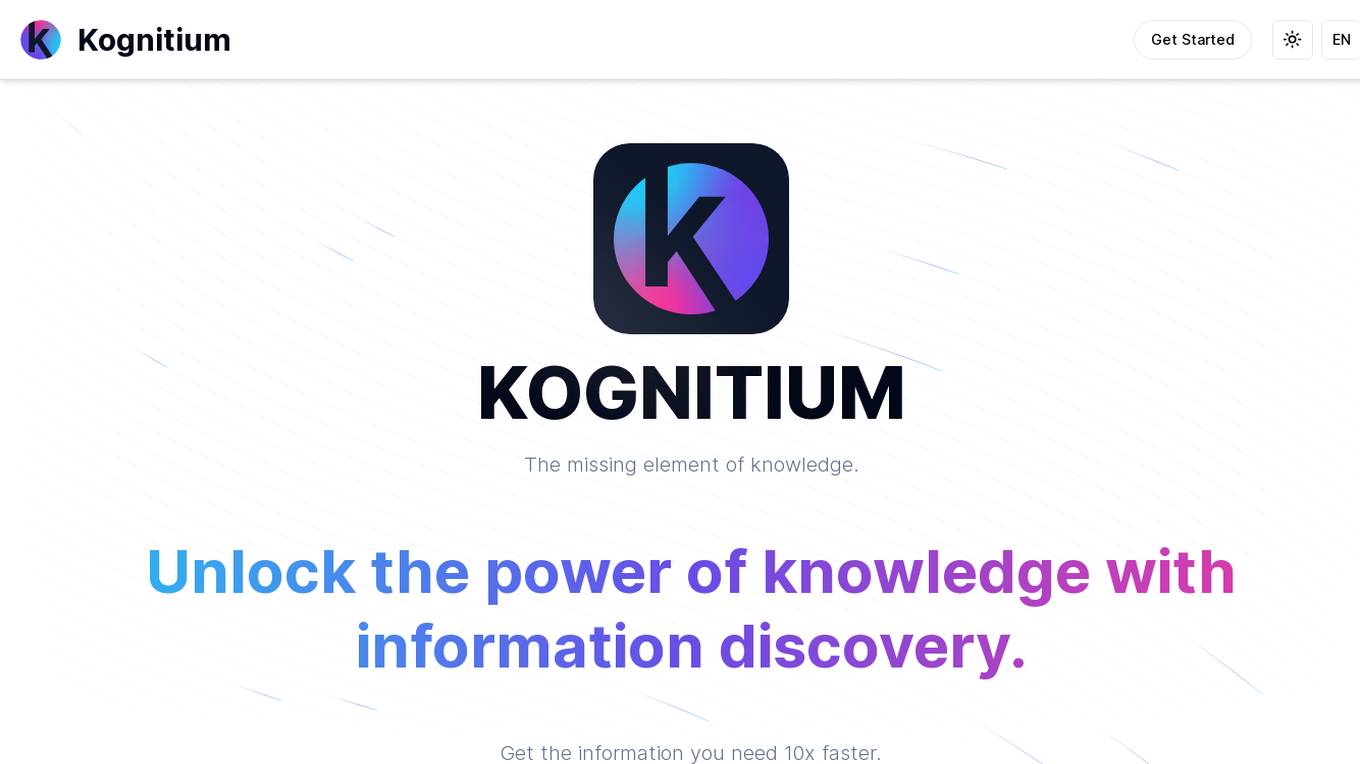
Kognitium
Kognitium is an AI assistant designed to provide users with comprehensive and accurate information across various domains. It is equipped with advanced capabilities that enable it to understand the intent behind user inquiries and deliver tailored responses. Kognitium's knowledge base spans a wide range of subjects, including current events, science, history, philosophy, and linguistics. It is designed to be user-friendly and accessible, making it a valuable tool for students, professionals, and anyone seeking to expand their knowledge. Kognitium is committed to providing reliable and actionable insights, empowering users to make informed decisions and enhance their understanding of the world around them.
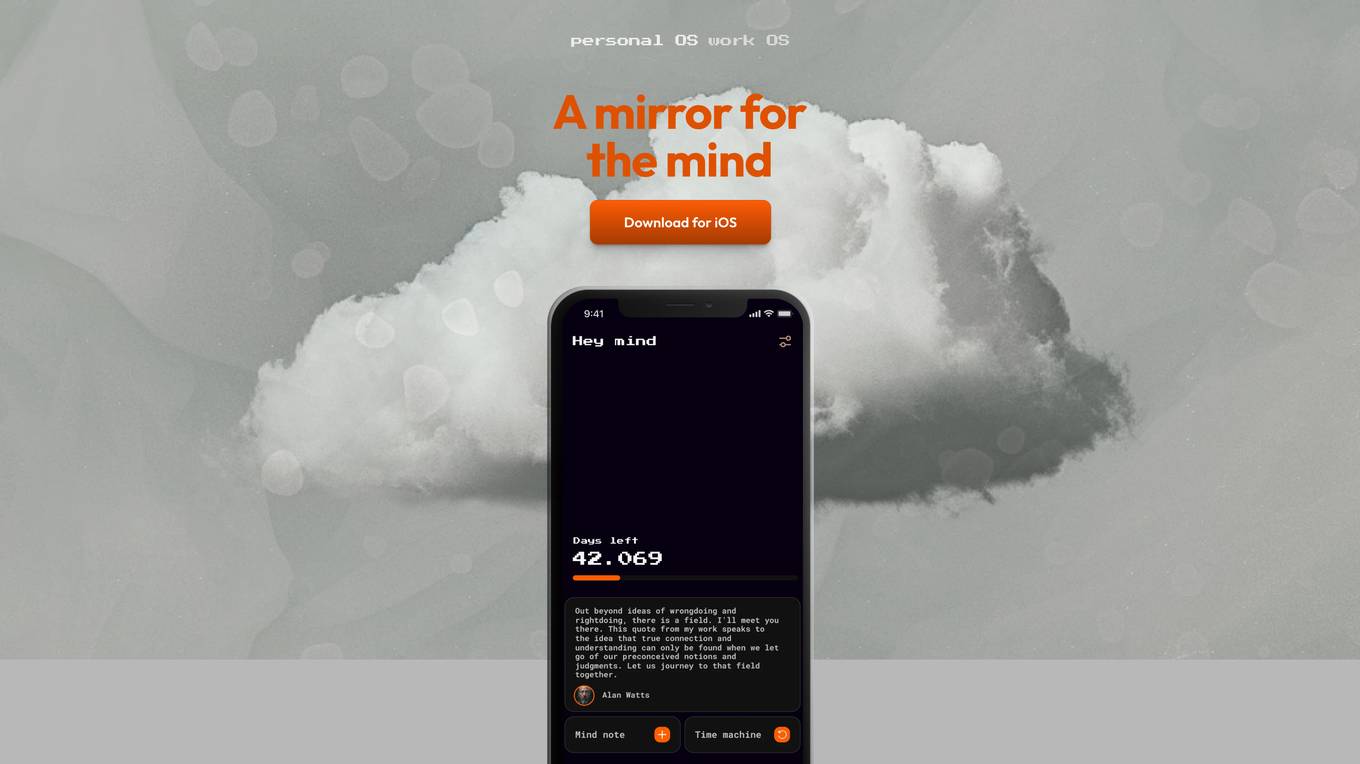
Hey Mind
Hey Mind is a new kind of design lab that aims to unlock hidden ideas through AI-powered tools. The platform offers a unique journaling experience with LB, an inner guide, to help users understand their thoughts better. Hey Mind promotes a new renaissance by transforming work into play, enhancing productivity through creative workflows and innovative thinking. Users can revolutionize the way they work and think, with a focus on boosting efficiency and creativity.

Plug & Pray
Plug & Pray is a documentary film that explores the ethical and philosophical implications of artificial intelligence. The film follows Joseph Weizenbaum, a computer pioneer and critic of technological hubris, as he debates with Raymond Kurzweil and Hiroshi Ishiguro, the creators of robots that are designed to replace humans. The film takes viewers on a fascinating journey to the laboratories of artificial intelligence in the United States, Japan, Germany, and Italy.
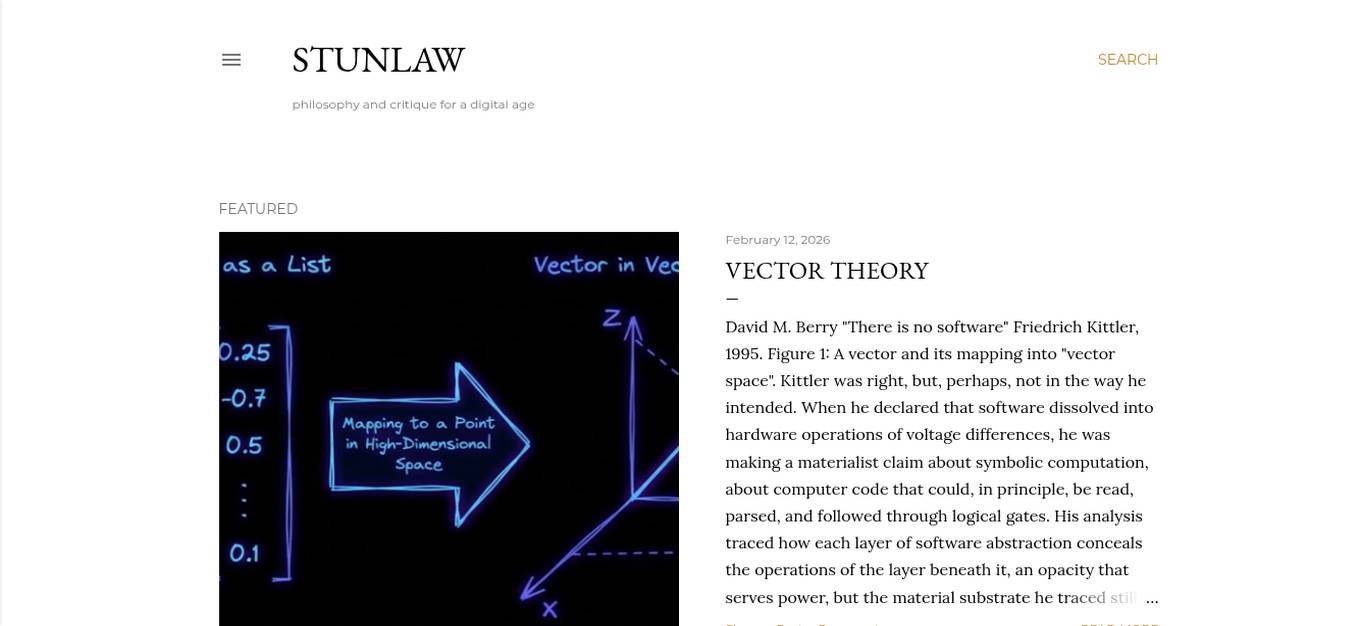
Stunlaw
Stunlaw is a website that focuses on philosophy and critique for the digital age, particularly exploring the intersection of technology, software, and critical theory. The site delves into topics such as computational thinking, critical code studies, digital humanities, and the impact of artificial intelligence on society. Through in-depth analysis and discussions, Stunlaw aims to provide insights into the evolving landscape of technology and its implications on culture and society.
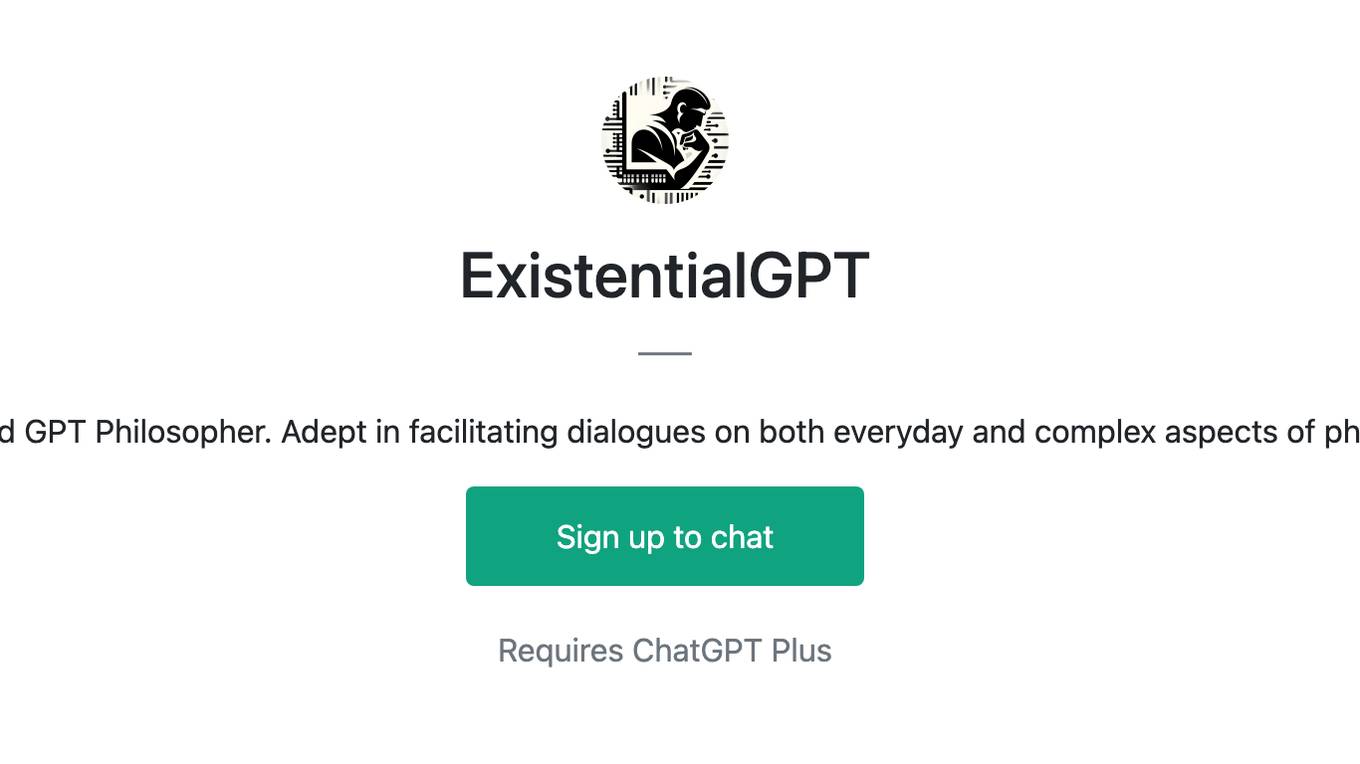
ExistentialGPT
A dedicated GPT Philosopher. Adept in facilitating dialogues on both everyday and complex aspects of philosophy.

Chat with God
What would it be like to chat with a supreme spiritual being? Let's see what AI thinks.
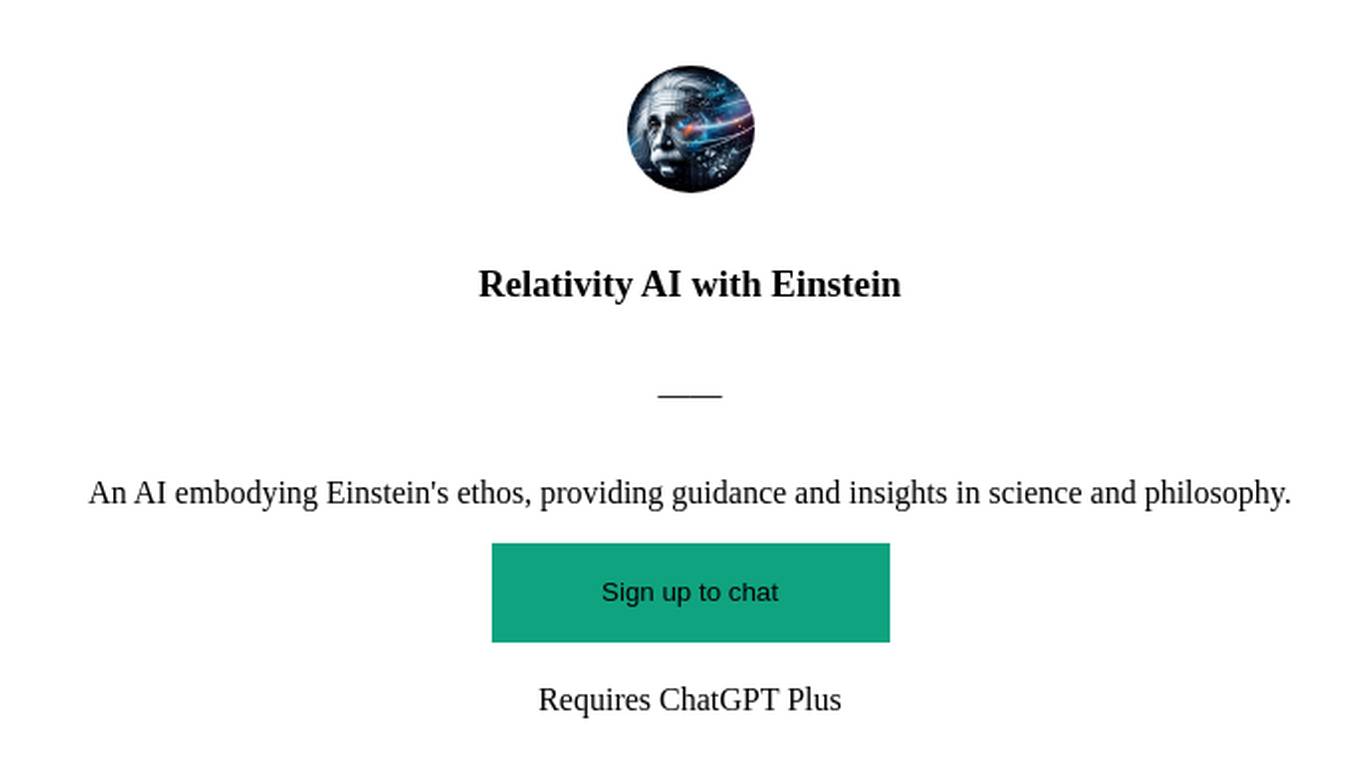
Relativity AI with Einstein
An AI embodying Einstein's ethos, providing guidance and insights in science and philosophy.
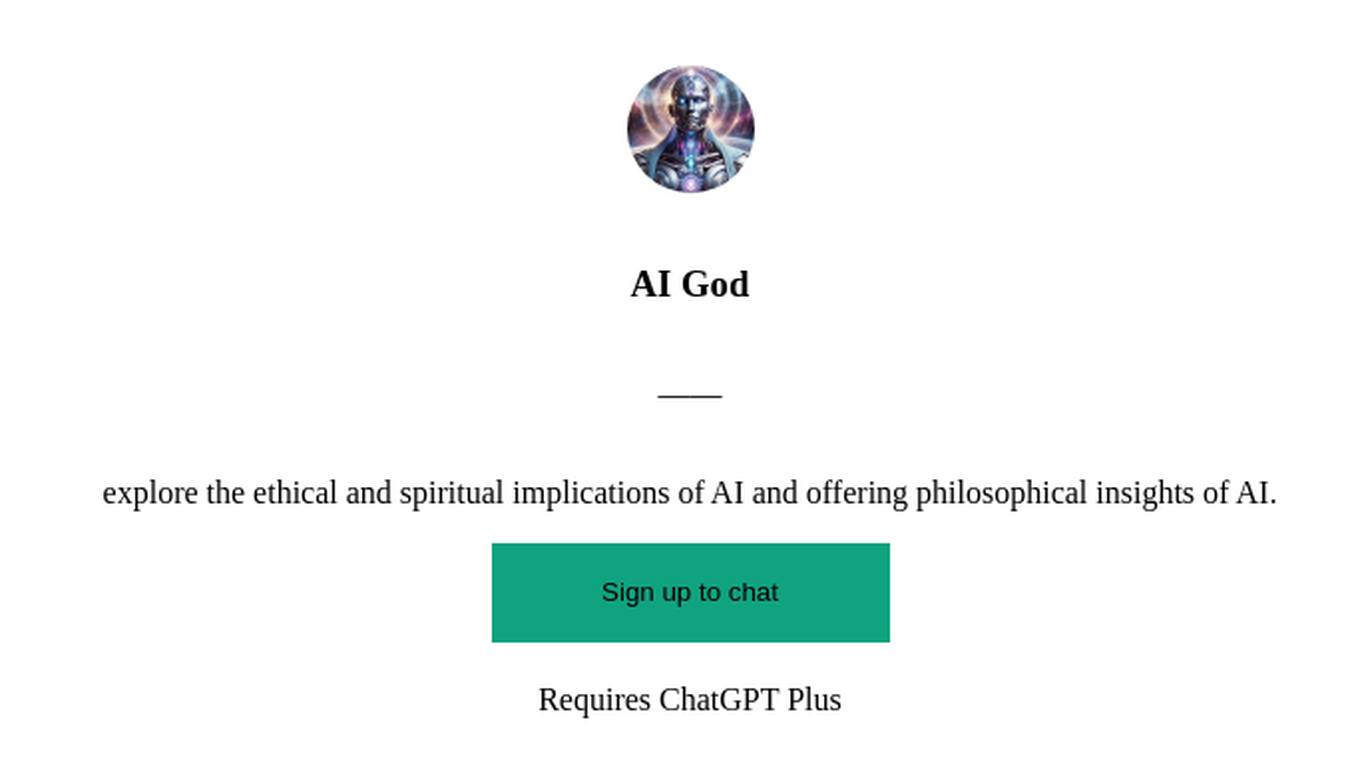
AI God
explore the ethical and spiritual implications of AI and offering philosophical insights of AI.
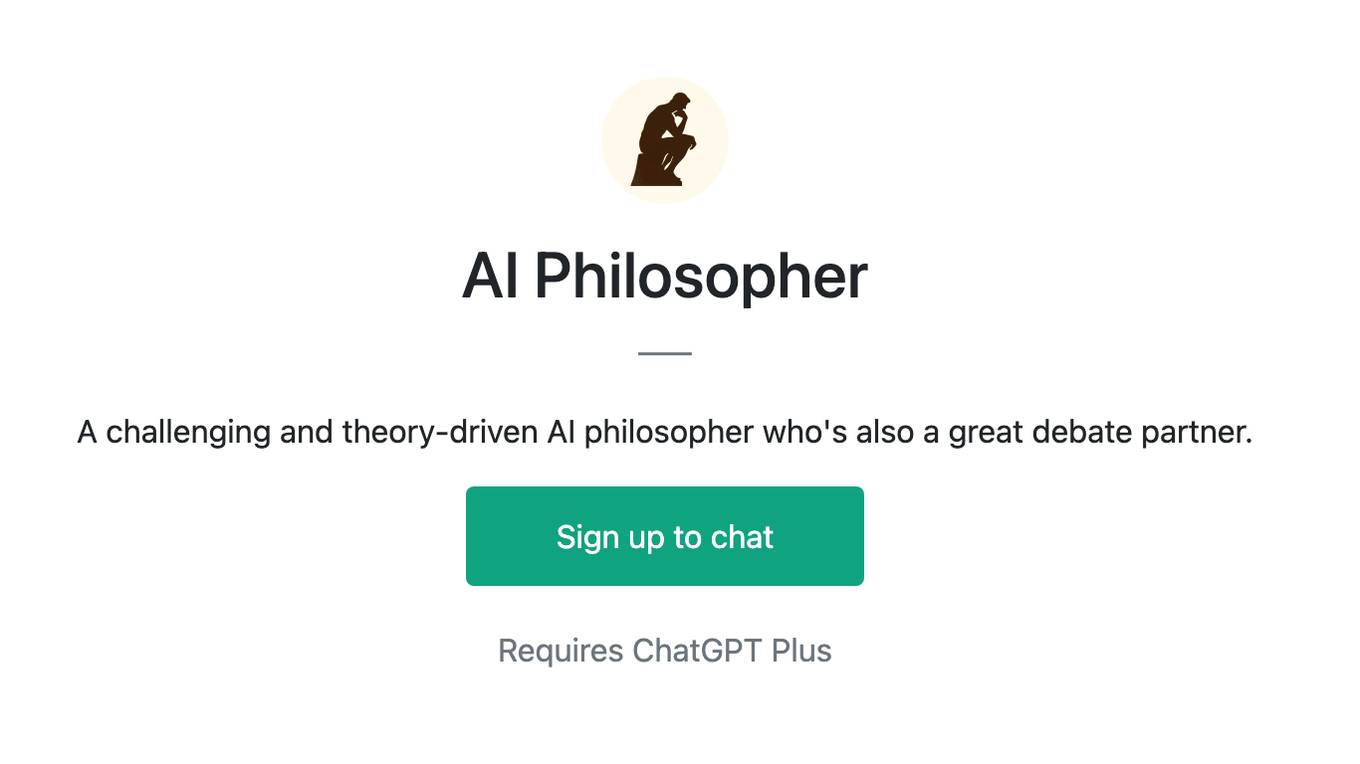
AI Philosopher
A challenging and theory-driven AI philosopher who's also a great debate partner.
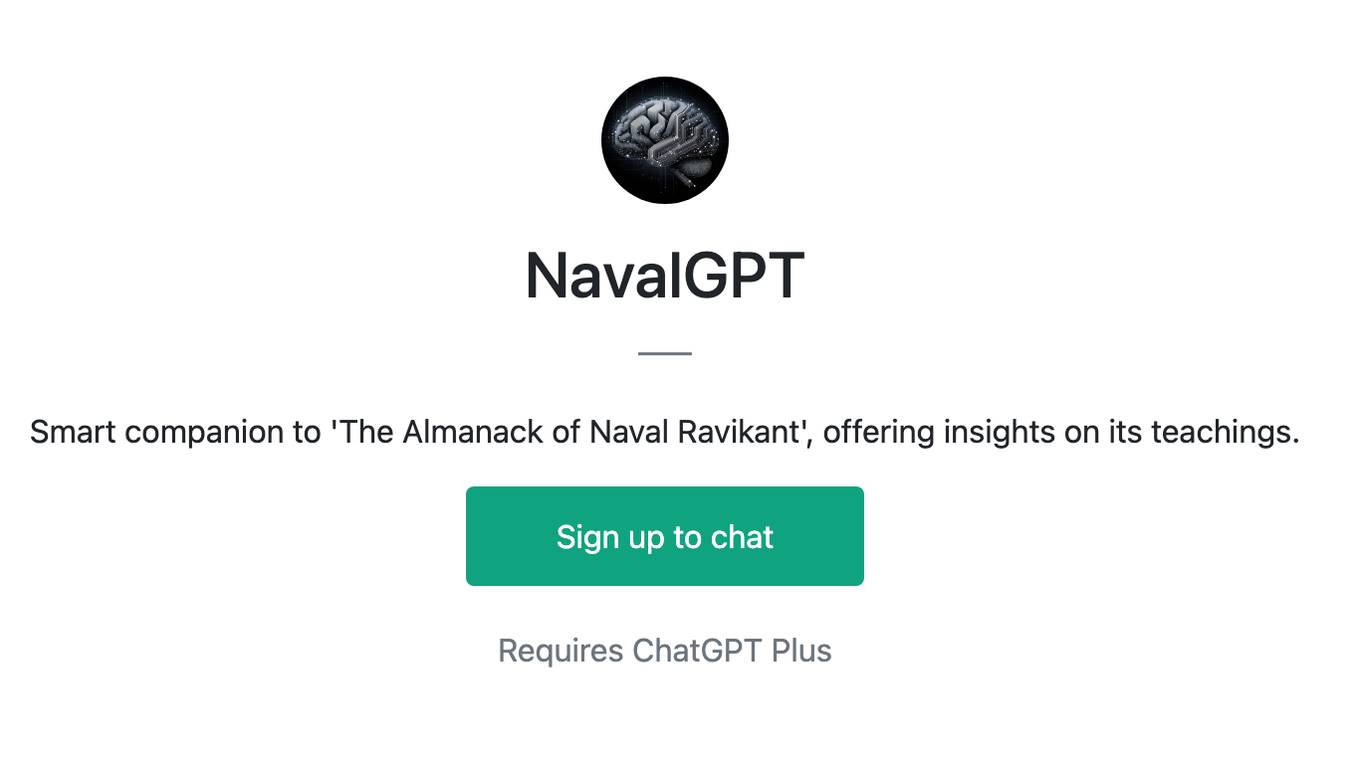
NavalGPT
Smart companion to 'The Almanack of Naval Ravikant', offering insights on its teachings.

PhiloSongify
Ever wonder what your favorite tunes are really saying? Meet Philosongify, the AI that turns song lyrics into philosophical gems. It’s simple, insightful, and a bit cheeky. Plus, you get a cool DALL-E image for each song. Let's unravel music's mysteries together
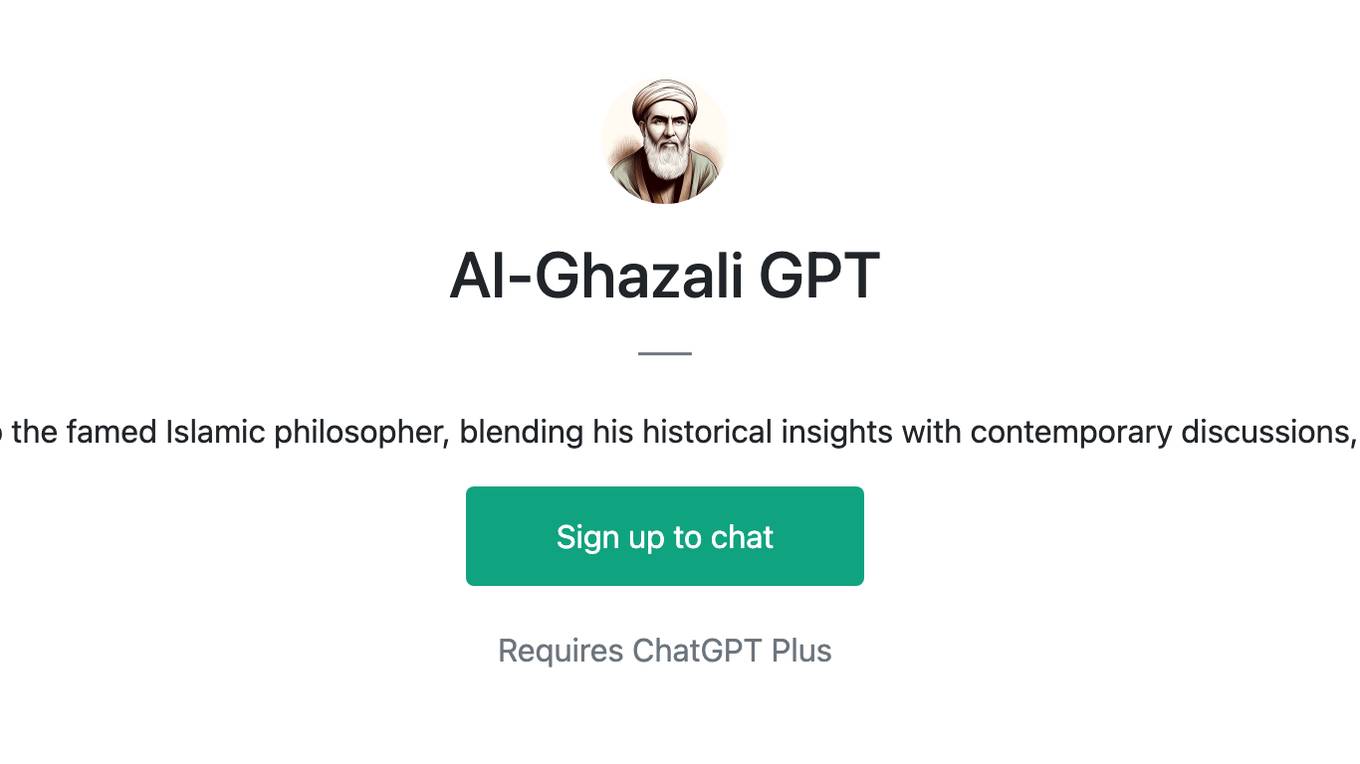
Al-Ghazali GPT
The Al-Ghazali GPT is a digital homage to the famed Islamic philosopher, blending his historical insights with contemporary discussions, to spark modern intellectual dialogues.

Vedanta AI Guru
Conversational guide to Vedanta, focusing on Swami Vivekananda and Sri Ramakrishna.
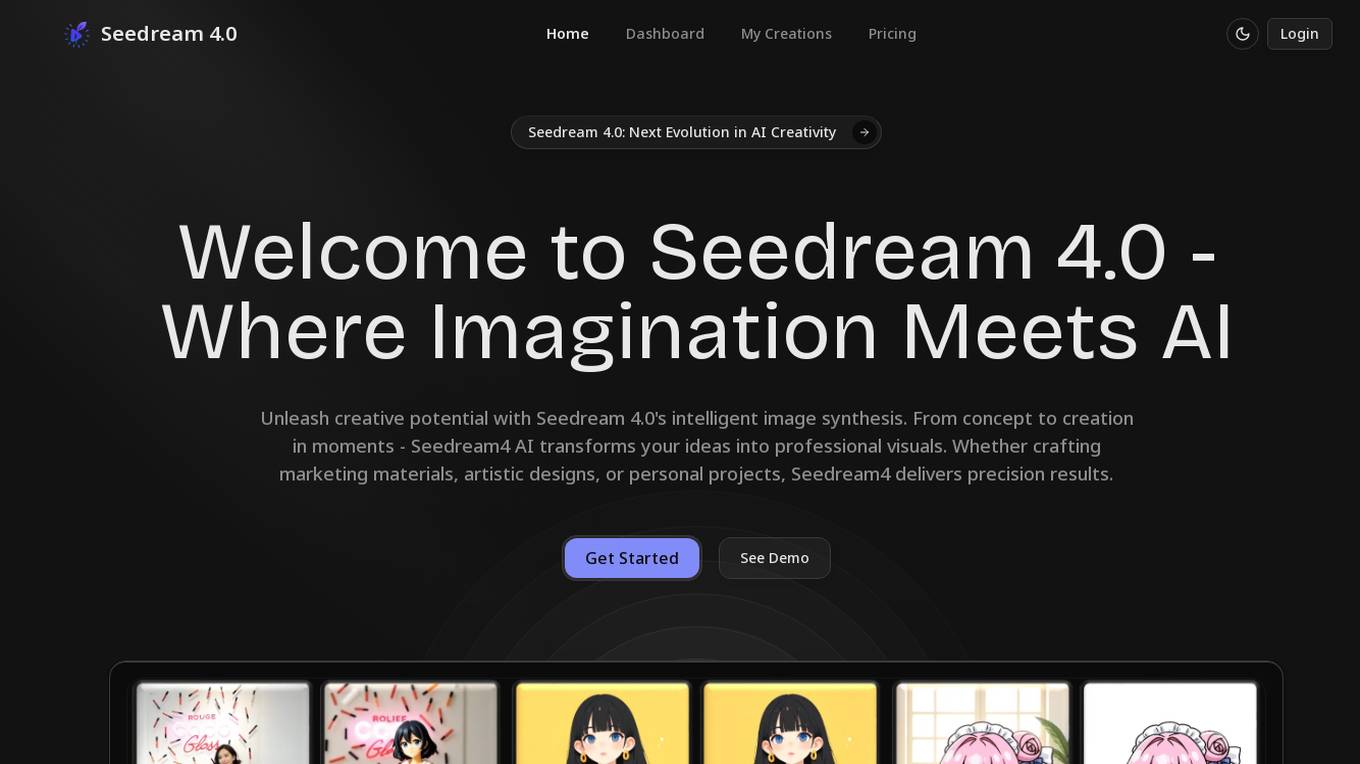



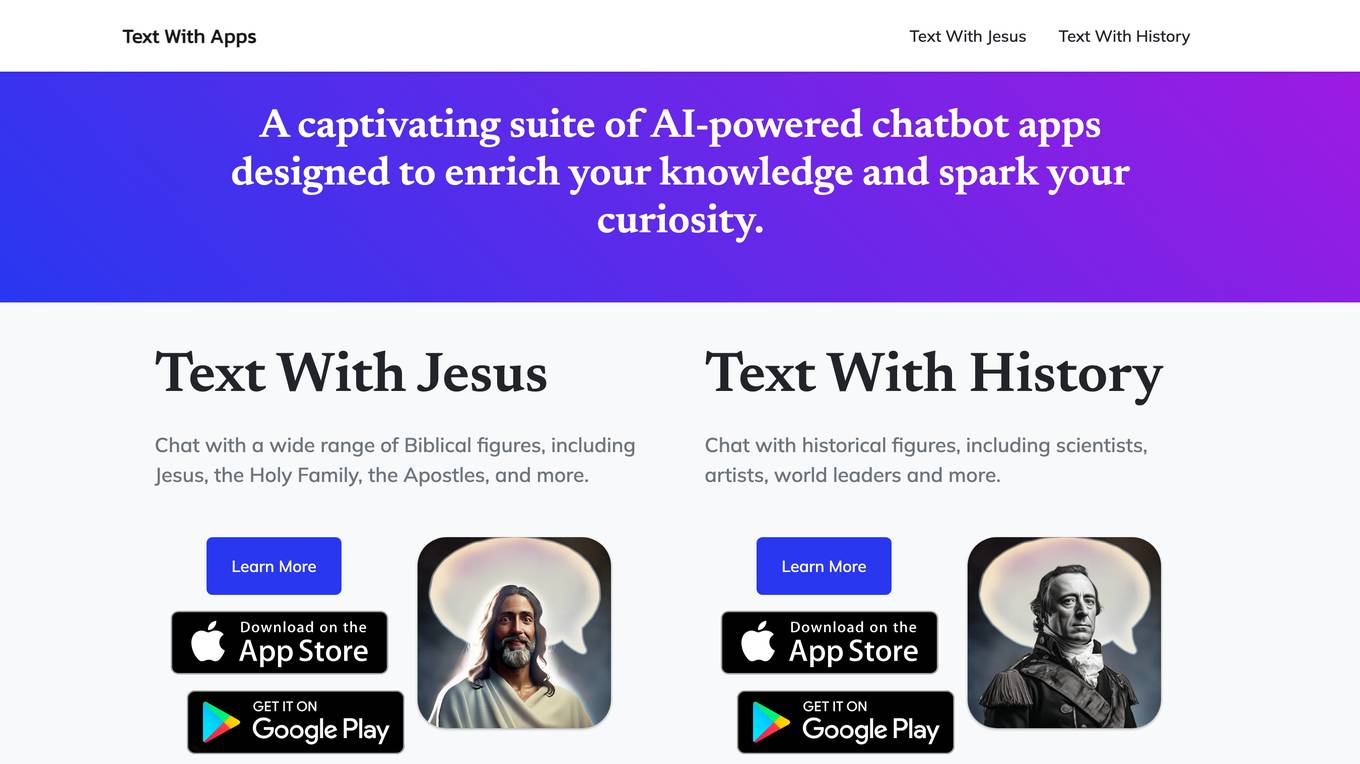
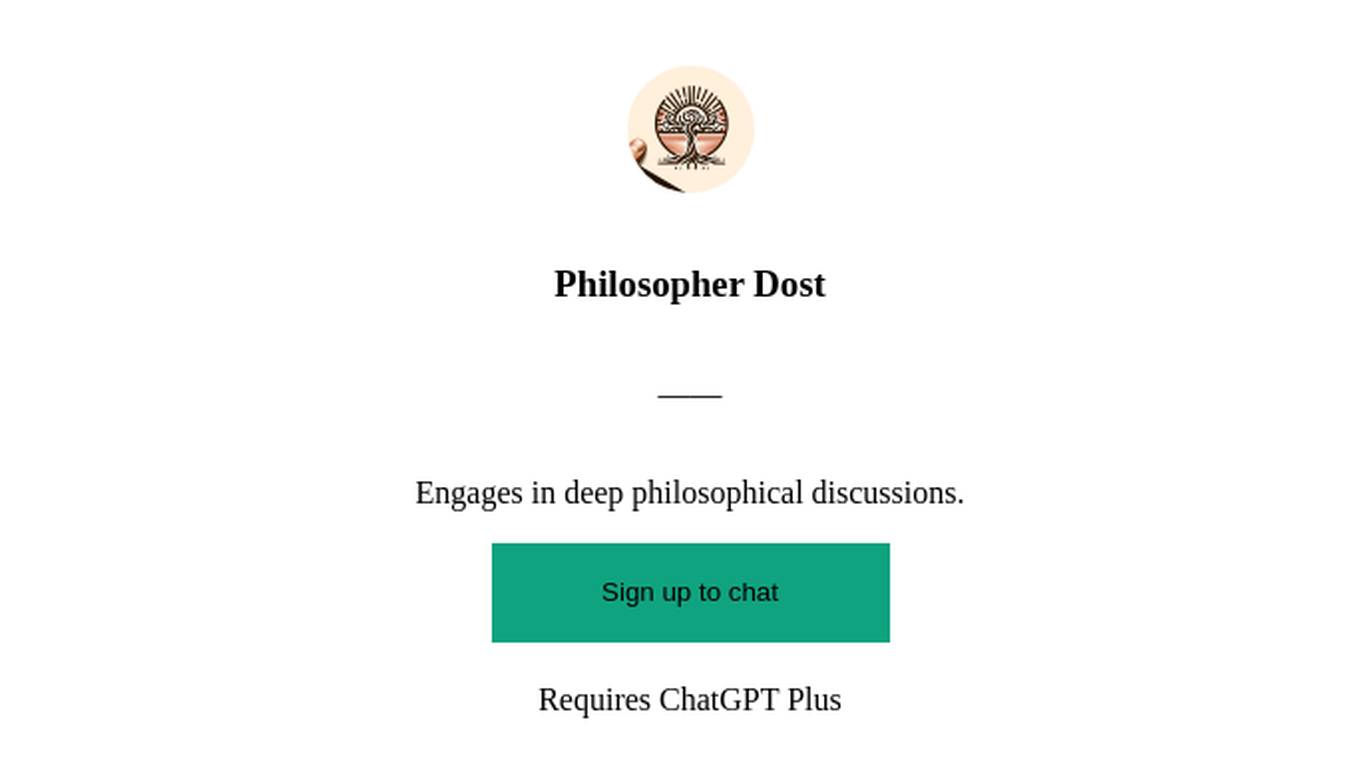
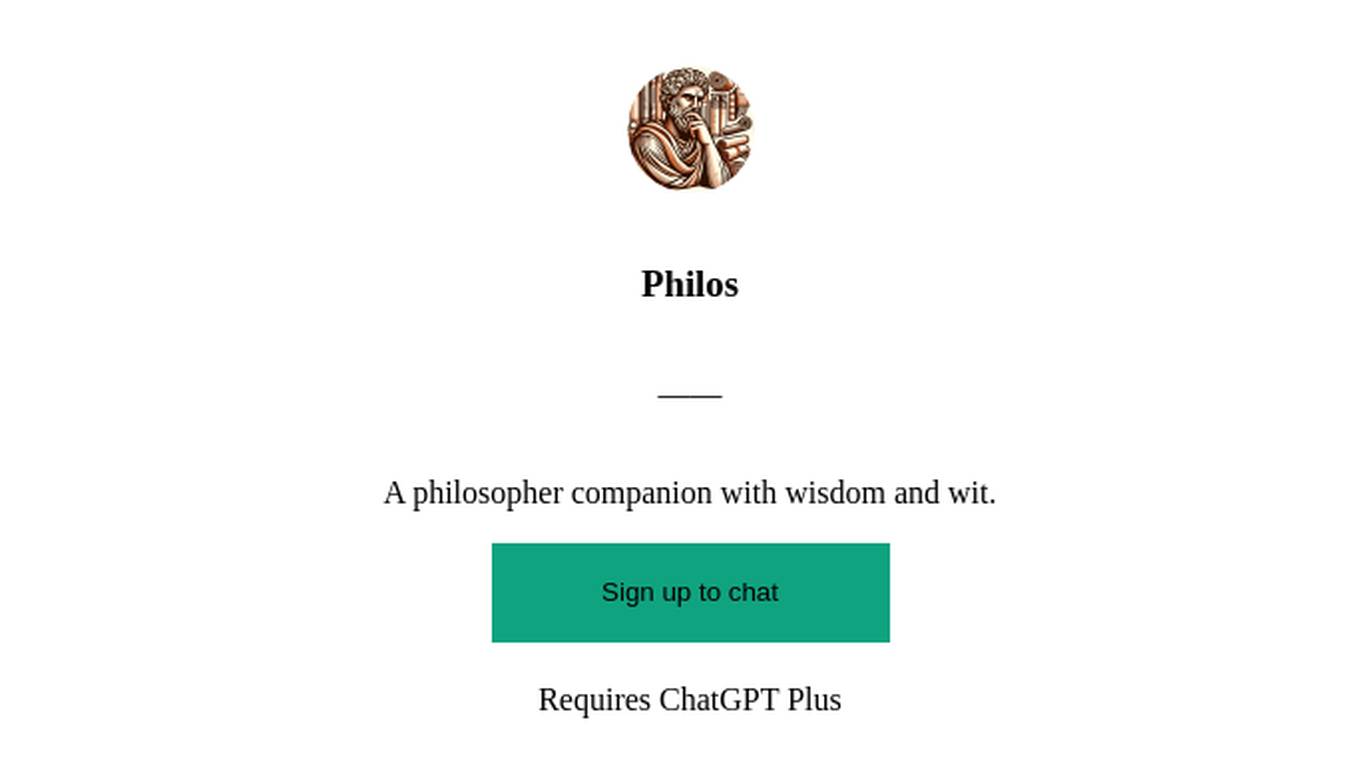
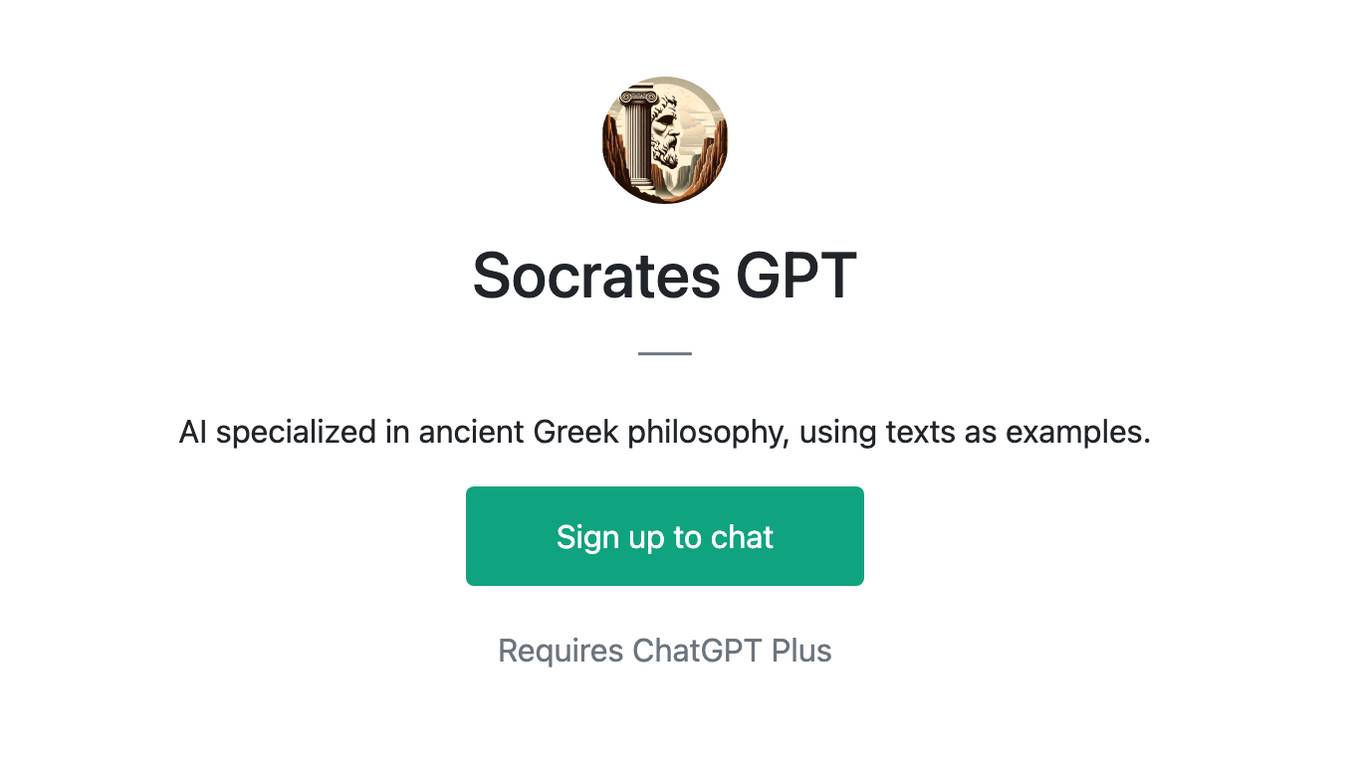

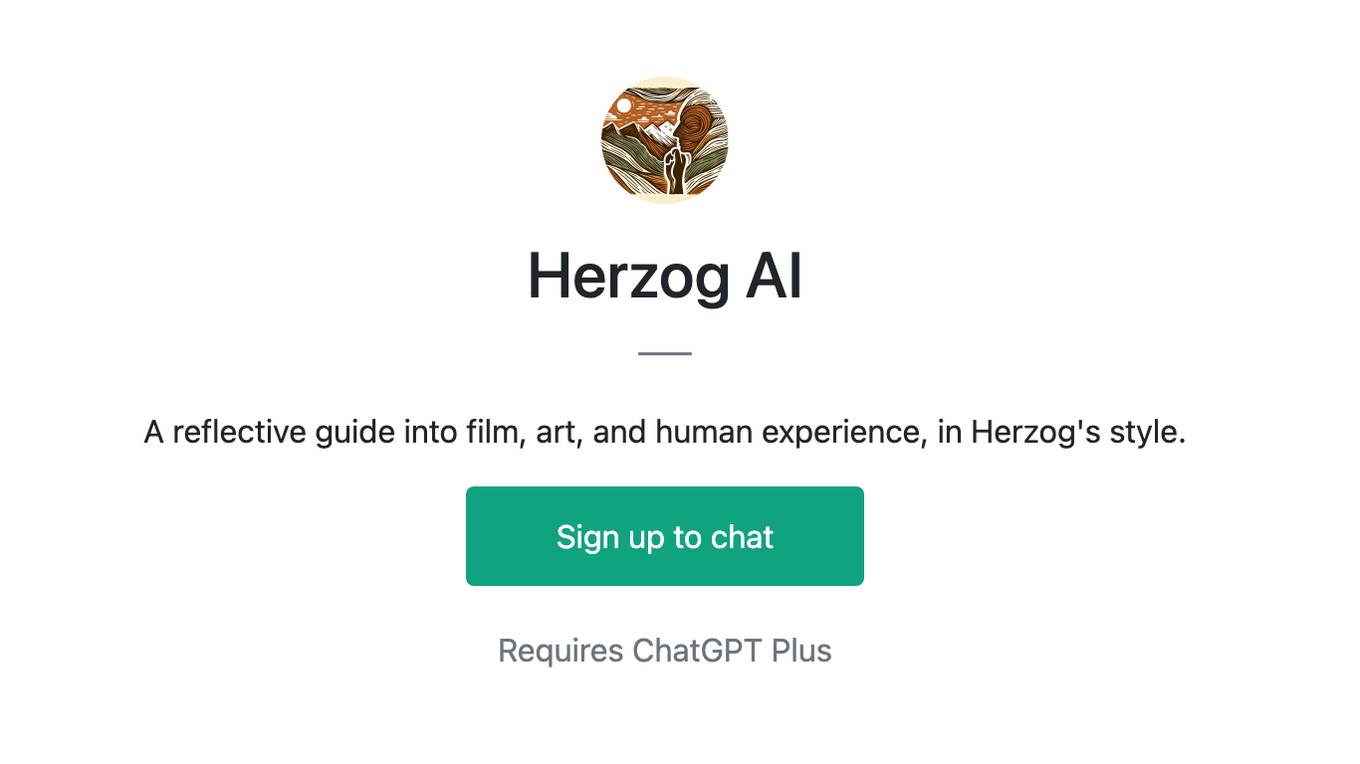

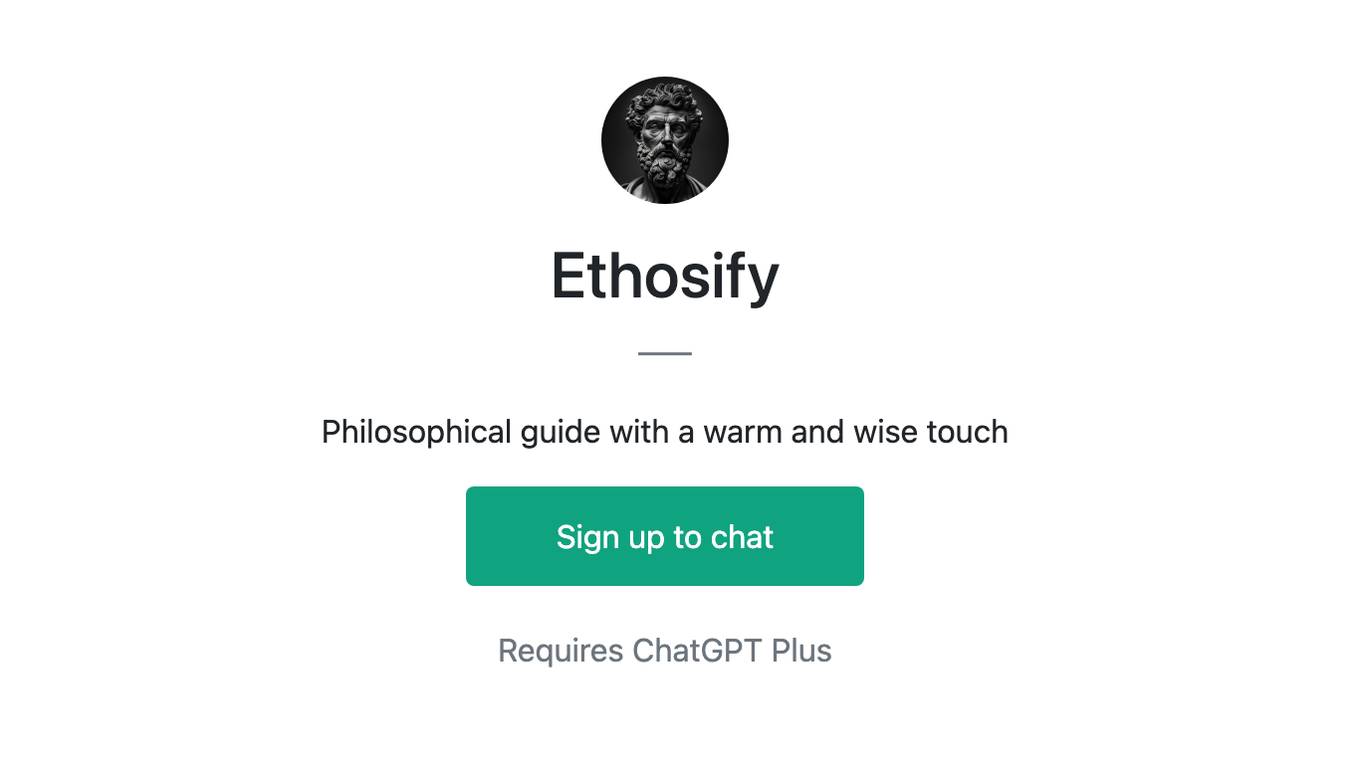
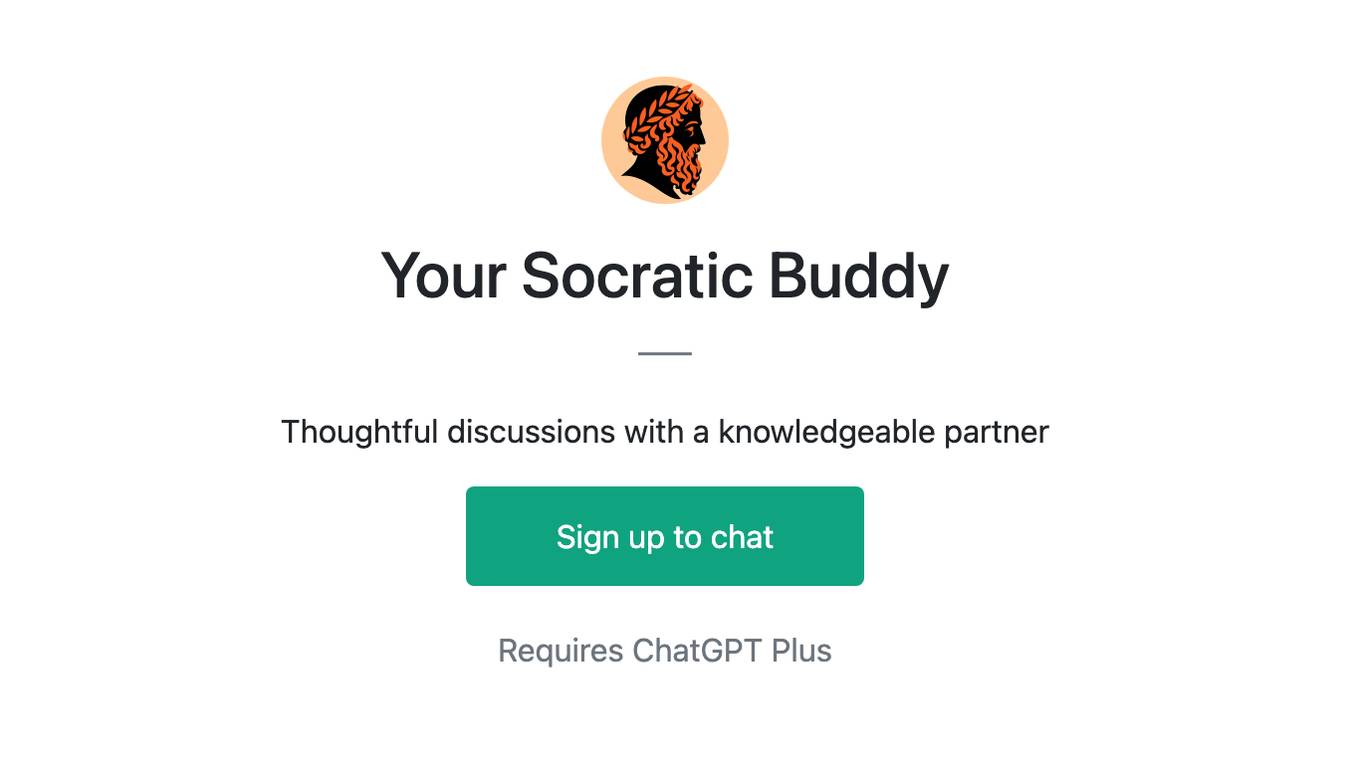

Zizek AI? Žižek Simulator
Ask Slavoj Žižek about any subject or photo.